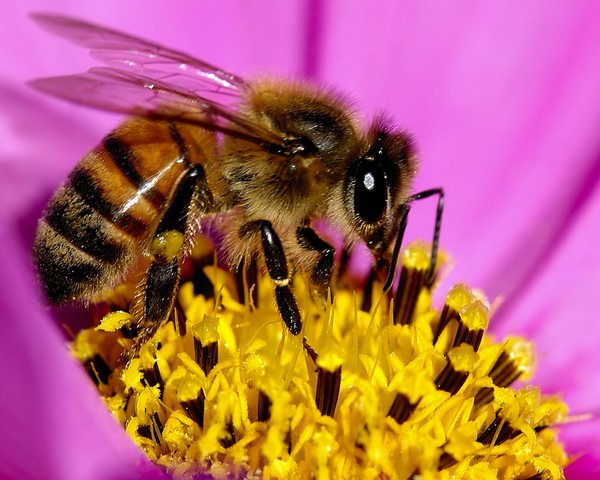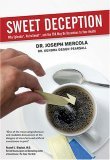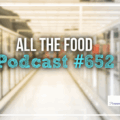 You might think that you’re eating healthier because you’ve replaced refined white table sugar with honey, but think again. I’m currently reading Sweet Deception by Dr. Joseph Mercola
You might think that you’re eating healthier because you’ve replaced refined white table sugar with honey, but think again. I’m currently reading Sweet Deception by Dr. Joseph Mercola and was amazed to learn about the process of forced honey production and its correlation with high fructose corn syrup (HFCS).
What I have learned from Dr. Mercola’s book is that there are bee farms that produce 2/3 of the annual honey production in North America by force feeding their bees high fructose corn syrup or other sugars, and keeping them under 24-hour hive lighting so that they will produce honey year round (the remaining 1/3 of honey produced in N.A. is pure honey). These tactics result in the bees producing a product that is only partially real honey; the other portion of the “honey” is high fructose corn syrup!
I am just astounded to learn this. When you buy what you think is honey in the cute little containers in the store, you do not see high fructose corn syrup listed on the label (if you have seen it, please leave a comment as I’ve never come across it). This is very sneaky; you think you’re buying honey, when in actuality, you’re purchasing a combination of some honey and HFCS! It’s just amazing to me, especially since I grew up seeing my dad harvest honey from his own hives. I watched him do that and then jar the pure honey and honeycomb. As a kid, I didn’t appreciate it, but thinking back, I sure do now!
So how do you know if you’re buying honey that contains HFCS if it’s not even listed on the label?
Please remember that I’m not one to recommend sugar in any form, and raw honey is another form of sugar. Even so, I think it’s important to spread the word on this topic in case you are interested in using honey as a sweetener. There are many who use honey instead of table sugar, thinking that it’s better for them. How many of these people know that they are ingesting HFCS, an ingredient that stops your brain from getting the signal that you’re not full (when you really are!) because your body doesn’t “see” the fructose.
If you do not have a problem with sugar addiction and want to use raw honey as a sweetener, just look for “100% certified raw organic honey” on the label. It will cost a few dollars more, but you are also getting the benefit that it is harvested without using potentially toxic chemicals, chemicals that are widely used in conventional beekeeping today (my dad didn’t use any chemicals).
I recommend learning more about this topic, sugar, and the artificial sweetener industry in Sweet Deception:
Note: I have updated my previous post Bread Made Without High Fructose Corn Syrup? to include a link to this post. The Aunt Millie’s bread that I highlighted in my previous post actually does contain high fructose corn syrup, because it contains honey (not pure, raw, organic honey).






I do not know what beekeeper you are talking about. I know of no beekeeper who feeds bees with honey supers on the hives. You should be making every effort to get the truth before you write such nonsense. Name the beekeeper if you have proof otherwise apologize.
i can’t believe they can sell honey like that without telling you how much high fructose corn syrup there is. i also always thought that i was buying pure honey, but i guess there must be some reason why organic honey costs so much more.
Once again the health-minded consumer is foiled by profit motivated corporate America. Thanks for the info. I will help spread the word.
I had no idea that this was going on. You opened my eyes to HFCS prevents you from feeling full – our health seems like it is so difficult to stay on top of with so many people out there making products like this.
I normally purchase honey that is 100% natural raw. But its really hard to get it as these honey doesn’t really sell at hypermarket.
Thanks for your comments everyone! 🙂
@Rick, yes, the book I referenced in my article (above) is by Dr. Mercola – Sweet Deception . He doesn’t list names of the honey manufacturers…it does sound like these are full scale operations since they are keeping the hives under 24-hour hive light, rather than individual bee keepers. I don’t see any reason that he would fabricate this information, especially since this topic takes up less than 2 pages in his entire book.
. He doesn’t list names of the honey manufacturers…it does sound like these are full scale operations since they are keeping the hives under 24-hour hive light, rather than individual bee keepers. I don’t see any reason that he would fabricate this information, especially since this topic takes up less than 2 pages in his entire book.
I’m not familiar with the “honey supers” that you wrote about. In my article I wrote that I learned that the bees are being force fed high fructose corn syrup and other sugars, not honey, and that this honey makes up 2/3 of the total honey production in N.A.
I hope this helps!
@goyin, yes, I didn’t realize this before, either. Like I wrote in my article, I still wouldn’t recommend using 100% pure honey in excess if you have a problem with sugar addiction, but if I were going to buy honey, I’d definitely buy the pure stuff from now on!
@WM, right, mass production to meet the demand. Of course, you could save money by getting off of sugar altogether! 😉
@Louiss, you might be able to find raw honey at Whole Foods, although I’m not sure because I haven’t looked for it there. It’s still sugar (so I wouldn’t use it), but the 100% pure is definitely a better choice if you are using honey!
this pisses me off! honey has an amazing flavor that is difficult to reproduce, and i cant afford raw honey. im curious though, why wouldnt the bee’s metabolisms convert/break down the HFCS? im thinking maybe i need to buy this book you keep talking about!
Hi Adam, I hope you had a Merry Christmas with your family. 🙂
I know what you mean, I never knew this about honey until I researched it in Dr. Mercola’s book, and I’ve since found other references to the same topic re: hfcs in honey in the book Sugar Shock! as well as online.
as well as online.
Re: your question on why the bee’s don’t metabolize the hfcs….the bees ingest the nectar that contains the hfcs and they regurgitate it, so it’s not “passing through” the bee’s body and being fully metabolized. Now there are companies that do not feed their bees hfcs, and those are the ones who bottle and sell organic or raw honey. Those are the labels you want to look for in order to avoid the hfcs. 😉
One note on this: if you want to avoid refined sugar, you’ll want to avoid all honey. It actually has a higher sugar content than table sugar. Since I’m addicted to sugar honey isn’t good for me, but if you don’t get sugar cravings and overeat from ingesting refined sugar, then honey might not give you cravings.
@Rick
Buddy, you’re floating down the river of DE-NILE Lol.
You said to tell you if someone finds honey that lists HFCS as an ingredent… well… I found some. It was at a fast food place, I think it was jack in the box or something like that. Either way, it’s on the little packets >>>>LABELED<<<< “Honey” but it actually doesn’t have ANY honey in it. Just HFCS and a carmel coloring, I believe. Crazy stuff. It really ticked me off. I thought I was getting honey and I was totally scammed. I’m seriously tempted to go and start a lawsuit about it, to be honest. I mean, when I go to the store and buy a 5 pound bag of sugar, I don’t expect to have to check the ingredents to make damn sure that it is, indeed, sugar (as it’s labeled and marketed as). If you’re willing to aid me in this lawsuit, please let me know. I’d like to form a small army and make a class action on this. Thanks.
Hi Cody,
Thanks so much for coming back and commenting to tell me about this, I sure do understand your frustration!
Well I’m not a lawyer and don’t know about how to do class action lawsuits so I wouldn’t be able to help you with that unfortunately but I’d be very interested to hear if you organize something. The only thing I’d check out first is the FDA rulings on the labeling of honey and high fructose corn syrup. They have so many loop holes re: how manufacturers can label their foods legally while it is very confusing (and I think misleading) for the consumer.
For example, how MSG, trans fats, and “sugar-free” products can be labeled and marketed very creatively so that if you don’t read the fine print or do research you won’t know what the product really contains.
No, I’m not saying I think that is right, not at all, so if you organize this I’d be interested to hear the outcome, for sure! (and I do think the labeling is very misleading for so many of the ingredients in processed foods).
Have you seen the recent TV commercials. The Corn Refiners Association decided to ’show’ high-fructose corn syrup was as safe as sugar.
They’re pretty crazy and I don’t think its safe advertising.